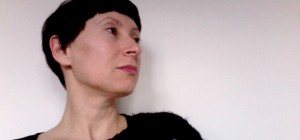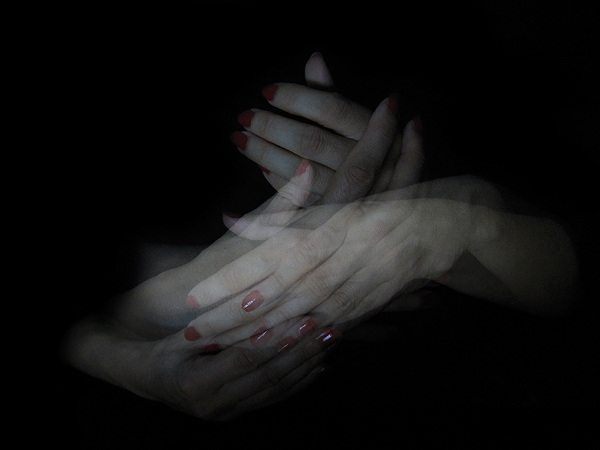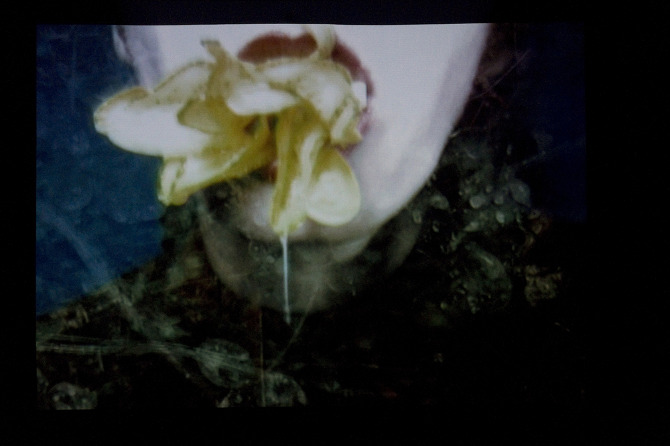By Eva Kekou, 4Humanities International Correspondent
Eva Kekou: Hello Ana!
Ana Carvalho: Hello Eva, and thank you so much for your invitation.
EK: Can you give us some information about your background?
 AC: A tendency to connection between several areas of creative knowledge comes into visibility when I consider what I do in general terms. This reflects my background and can be seen in whichever project I am involved with. I have a degree in visual communication and for many years I worked in corporate contexts both as graphic as well as web designer. I still develop projects for the web as freelancer. In 2004 I finished my master’s in interactive art & design, which took me professionally to teaching, to researching and into an art practice. Since then, I have been doing live performance with video and recently I also compose for live audiovisual performance. That is, I develop composition scores. So far I have only played these scores with sound artists but I would like to give other artists (video and sound) the opportunity to play them.
AC: A tendency to connection between several areas of creative knowledge comes into visibility when I consider what I do in general terms. This reflects my background and can be seen in whichever project I am involved with. I have a degree in visual communication and for many years I worked in corporate contexts both as graphic as well as web designer. I still develop projects for the web as freelancer. In 2004 I finished my master’s in interactive art & design, which took me professionally to teaching, to researching and into an art practice. Since then, I have been doing live performance with video and recently I also compose for live audiovisual performance. That is, I develop composition scores. So far I have only played these scores with sound artists but I would like to give other artists (video and sound) the opportunity to play them.
EK: We share some of the same research interests: identity (collective and individual) is something of great interest to me as well as memory construction. How did you get interested in this? How do you understand identity and memory in your work?
AC: A long time ago, more or less anonymously, I have published a poetic chronicle in a Portuguese illustration and comics magazine. I developed a whole identity around the author-persona. It was really interesting to hear how people reacted to a name and what it suggested to them. Writing has been, since then, an element of my art projects, either as part of the process or as part of the performance, through video or sound. For this reason, and since then, to develop parallel identities has been always present in my work.
Recurrently, my research interests come from practical experiences in art practice. For identity, as means of expression or part of an artistic project, to become a subject of interest, I took part in a series of informal conversations with other artists who had similar and complementary interests. The interest in collective identity comes from my work as part of VJ Theory and other collaborations, between 2005 and 2009. How this related to memory construction? It is an identity, of the individual, the collaborative group and the collective, that needs to be constructed, retrospectively, through memory of what the practice is.
EK: You are among the first performance artists I’ve interviewed for 4Humanities. I would like to know what is intriguing in performance for you? How does performance relate to visual communication and to your work in particular?
AC: I am interested in the “now” as an enacted and defined length of time, that is, when artists and audience comes together to share an experience, which the first produces and where the second participates. This presence in the “now” is performance. The performance (an element of it, the performer-artist) is a departing point to consider subjects I have been interested for a long time: identity and more recently the relationship between documentation and the ephemeral. Personally, I find it difficult to finish a project by accomplishing a result as an object, therefore my interest in process. Performance is an ideal context in this sense, as part of an ongoing process, which is, in its totality, a lifetime. I see all the performances as only one performance in chapters because each new one evolves from the previous one and they are all connected.
Performance relates to visual communication and plays a great role in experimenting with images. The tools, that is, media technology, are also a way to connect.
EK: I know you are now a PhD candidate and that you are defending your thesis in a very short time. What is your research about?
 AC: I defended my thesis earlier this month. My research is about the connection between the ephemeral in contemporary live audiovisual performance and its memory construction and future study through the possibilities of documentation. I have defined a structure for live audiovisual performance as a group of intermedia practices, and I also researched how contemporary artists and festivals relate to documentation. Finally, based on the structure and on the findings, I proposed a series of protocols to documentation not only of an event but also of its process of creation and development.
AC: I defended my thesis earlier this month. My research is about the connection between the ephemeral in contemporary live audiovisual performance and its memory construction and future study through the possibilities of documentation. I have defined a structure for live audiovisual performance as a group of intermedia practices, and I also researched how contemporary artists and festivals relate to documentation. Finally, based on the structure and on the findings, I proposed a series of protocols to documentation not only of an event but also of its process of creation and development.
EK: Can you give us some information about VJ and your related work?
AC: My perception of a VJ is as an intermedia artist who can also be called by other names, such as live audiovisual performer (which is applicable to visual performers as well as sound performers). I am fond of the VJ as a persona-identity. The narrative constructed by the VJ – the live artist image remixer – during the performance, regardless of its length and of its context, traces a relational parallel to a nomadic way of living only possible through the mobility of contemporary technologies. The VJ also carries an attitude, continuing in the same relational parallel, during the performance, about its presence in the “now” and as the conscience of the individual and its place as an individual living in the present times. Finally, something I relate to closely as well, the VJ is always working in collaboration. This relational definition of the VJ informs my work, although I am not too interested if I am a VJ, live audiovisual performer, or something else.
EK: Can you please inform us about the situation in academia in Portugal? How are things for researchers, students, academics in your experience? What should be changed or to which direction should academia in Portugal shift to keep up with other universities worldwide?
AC: My experience is not vast enough to give you an informed perspective on the academic context in Portugal. Not only I have been an immigrant for most of my professional life; but also the existence of my work in the academic context is specific. I developed a research project (VJ Theory) and once this took the actual shape of an archive I started my PhD. The former was within a Portuguese faculty (the humanities faculty) that follows very classic academic models in which I felt like a very strange element. The structure and procedures of the faculty presented, by itself, a tremendous challenge with its rules and expectations. I sense, across faculties and universities alike, changes taking place as the borders open up though individual experiences of both teachers and students (through exchange between universities of several countries). New courses start to open, responding to social needs and to students’ interests, more directed to the new ways of perceiving the world rather than the classic organization structure. Hopefully, these changes will also make a stronger impact on the educational system, which is still based on parameters and hierarchies that are too traditional.
EK: Can you give us some information about the media art scene in Portugal and about some major contemporary Portuguese artists?
AC: The media art in Portugal reflects what is happening outside, especially in Europe but also in the United States. It is a microenvironment: we have research related to technology and development labs outside academia. Museums are not too interested in media art, and neither are the galleries. Most contemporary Portuguese artists work abroad, either living in other countries or from Portugal. All of them find their peers mostly elsewhere, but then I think it is because we are a very small country anyway.
EK: Can you also give us an idea about festivals and events happening in Portugal?
AC: Festivals are few and far between due to the economical crisis end consequent lack of funding. We had a very good performance festival here in the city of Porto called Trama. The concept of performance was broad to encompass an eclectic selection of projects. Festivals tend to come and go; in the past year there were also a couple of festivals in Lisbon, UM and Número that were essentially focused on sound performance, but that won’t continue into the future.
 On the other hand, I think artists and other professionals related to performance understand more than before the relevance of a festival as a meeting time-space for connecting and presenting. In the mentioned festivals, the visuals are more a translation of sound as the central and leading art form to images, resulting from collaboration. For three years I was involved in the organization of an audiovisual festival in Lisbon called abertura.Tthe focus was on the collaborative dynamics from where live audiovisual performance emerges as dialogical exchange. We will have to wait for future developments, which are happening already, to come to fruition, that is, to visibility. I am sure we will see things changing in the near future.
On the other hand, I think artists and other professionals related to performance understand more than before the relevance of a festival as a meeting time-space for connecting and presenting. In the mentioned festivals, the visuals are more a translation of sound as the central and leading art form to images, resulting from collaboration. For three years I was involved in the organization of an audiovisual festival in Lisbon called abertura.Tthe focus was on the collaborative dynamics from where live audiovisual performance emerges as dialogical exchange. We will have to wait for future developments, which are happening already, to come to fruition, that is, to visibility. I am sure we will see things changing in the near future.
EK: How is the situation with museums and galleries in Portugal, considering the economic crisis most Mediterranean countries face.
AC: I am inclined to agree (against the norm) with someone I know who says we are not a Mediterranean country but rather an Atlantic country. Perhaps this in between (Mediterranean and Atlantic) is part of what defines our identity. Changing the name of the ocean we look at when we look to the ocean doesn’t change the political and economic situation but it’s a way to understand it. What I mean is that in general the arts develop in a parallel direction to the artistic institutions. But it’s not new, as this is the situation artists have been facing for a long time. Artists, individually or in collectives, manage spaces and create but make money through other means, which are not artistic. Nonetheless, now we have less money to fund new projects.
EK: What are your next steps and future plans? Which direction would you like to go with your work as an artist and academic?
AC: Following up the research of the last three years, developments from finishing my PhD inspired the need to start a new project. It is a publication in little books of artists’ documents called Ephemeral Expanded. The focus at the moment is on writings and scores related to the performance as part of its development process. Academia has so far been the context for reflection and for theoretical formulations of the practice. But that does not exist without the dialogical relation. Practice is where I find the problems that feed the theory, the reason why I am interested in it, and where I apply what I learn. In this sense, my work has been, and will continue to be, affected by theoretical reflection. I have been composing scores for my live audiovisual performances and intend to take this action further by, for example, inviting other artists to play my compositions and also by developing scores with other artists.